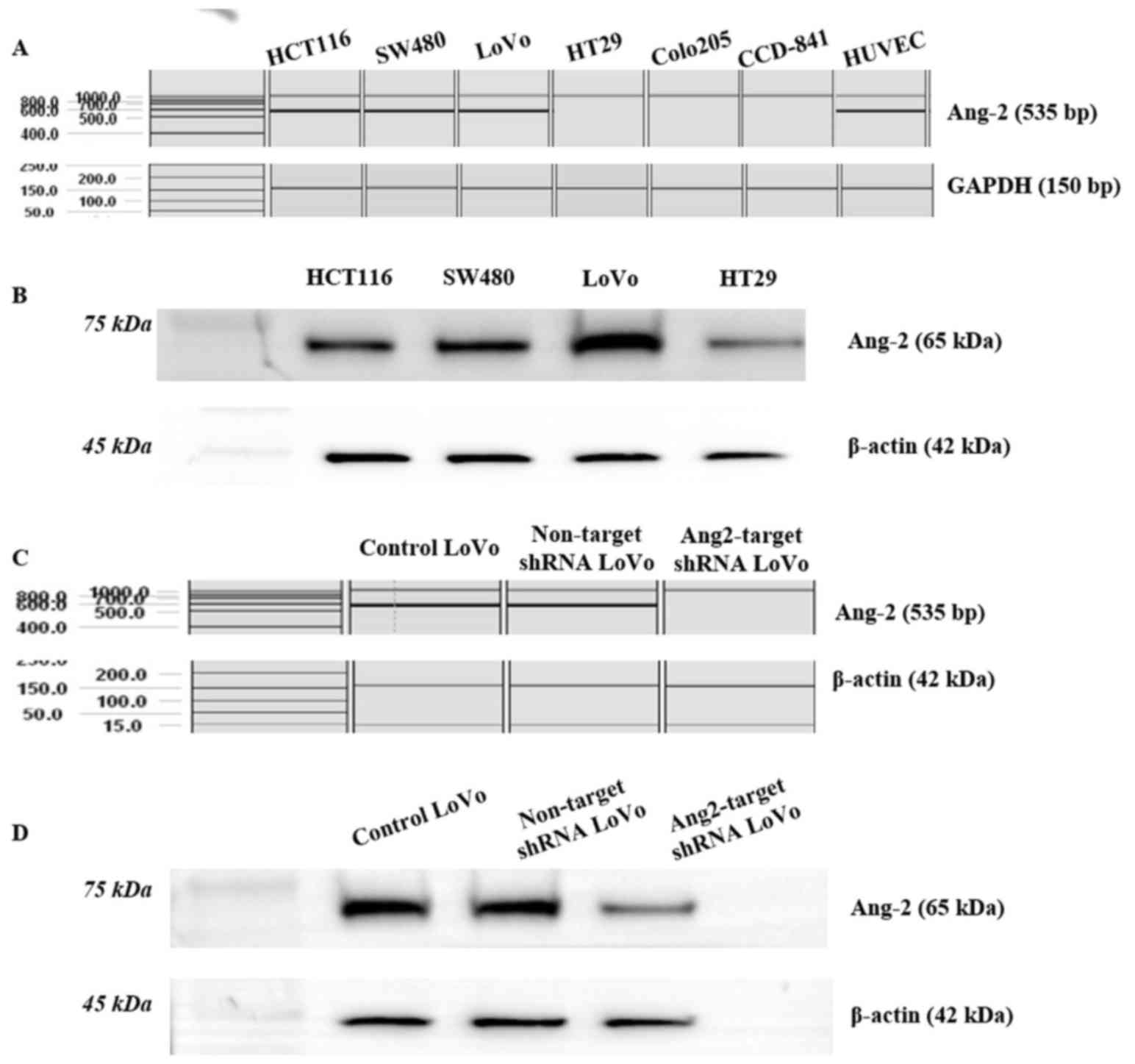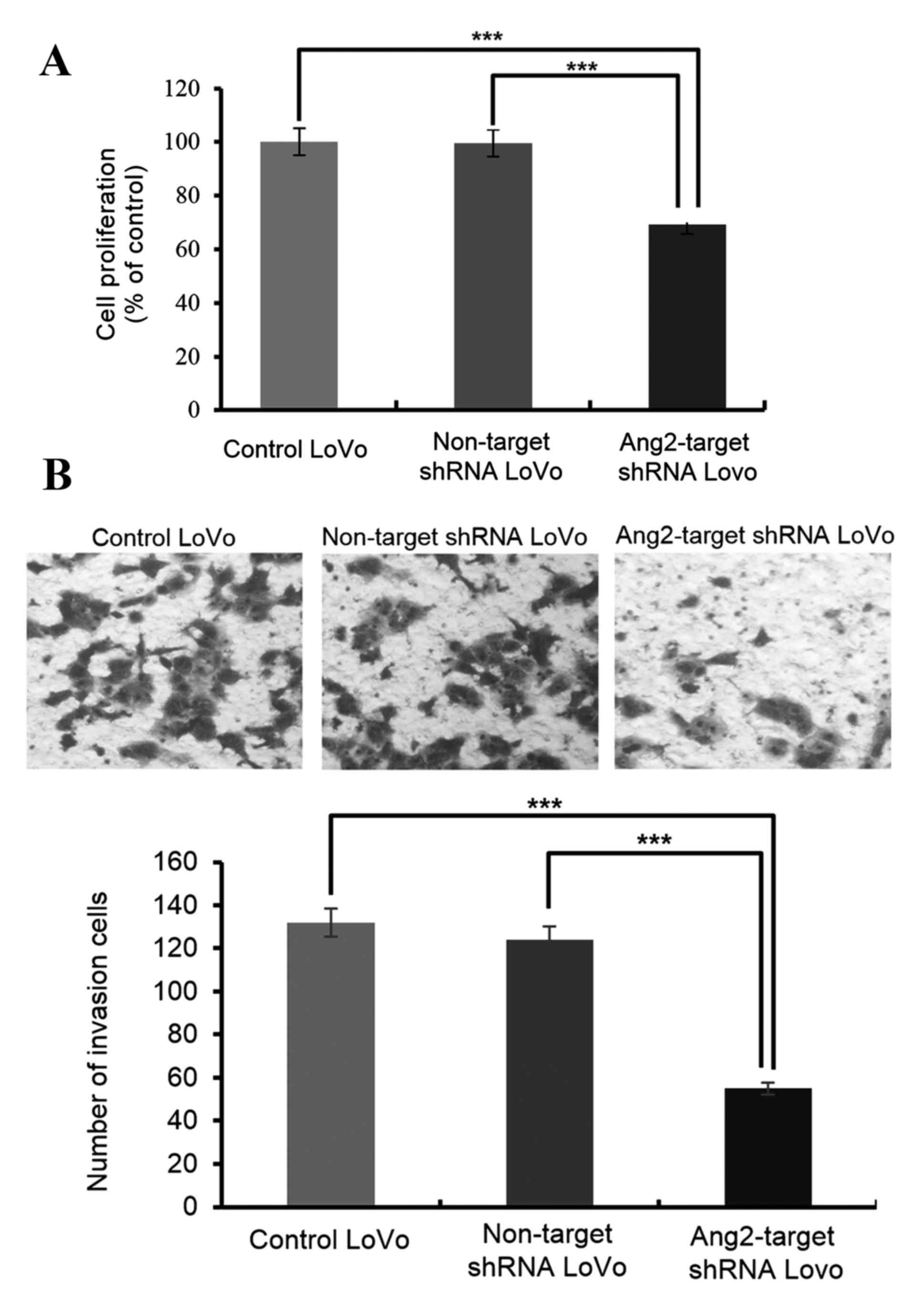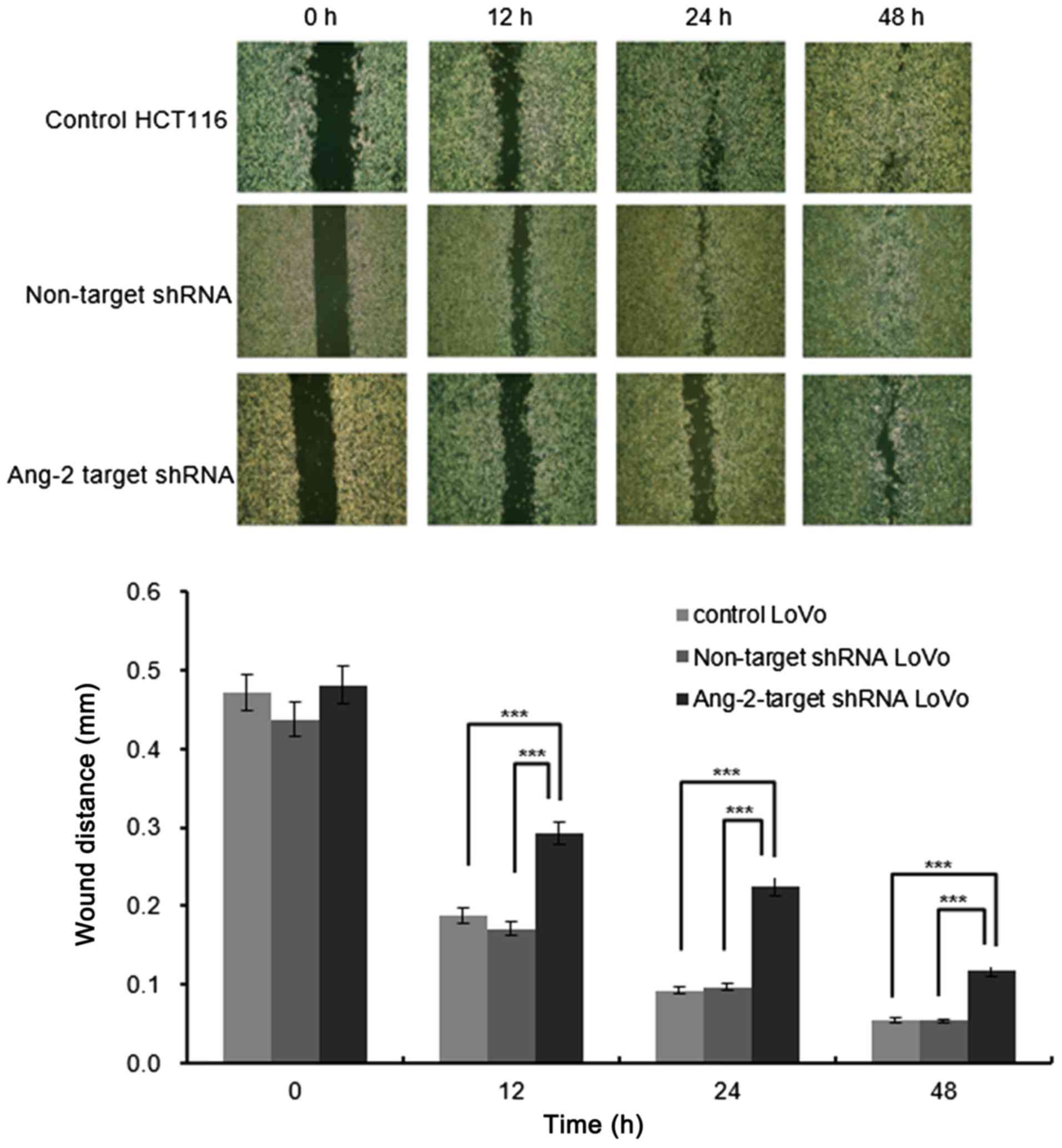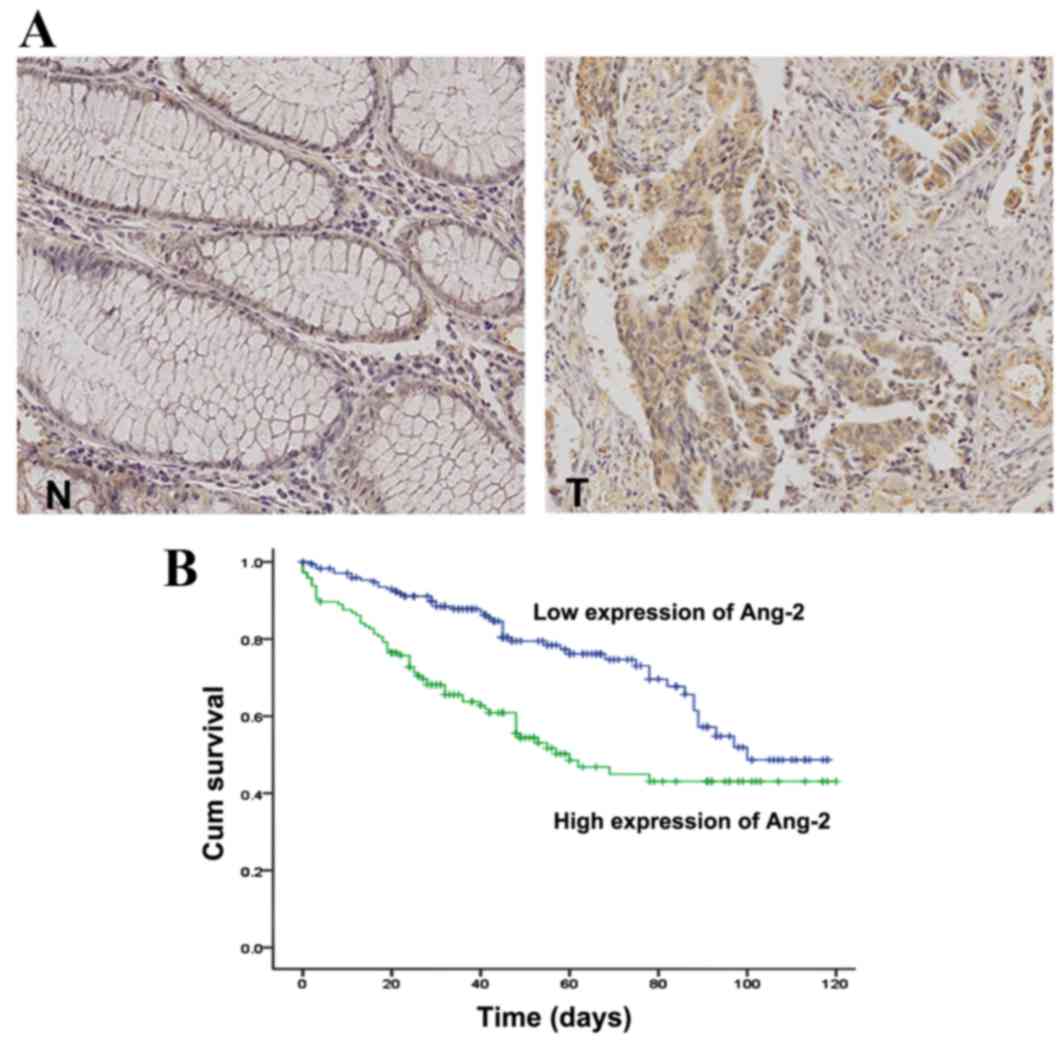|
1
|
Fiedler U, Krissl T, Koidl S, Weiss C,
Koblizek T, Deutsch U, Martiny-Baron G, Marmé D and Augustin HG:
Angiopoietin-1 and angiopoietin-2 share the same binding domains in
the Tie-2 receptor involving the first Ig-like loop and the
epidermal growth factor-like repeats. J Biol Chem. 278:1721–1727.
2003. View Article : Google Scholar : PubMed/NCBI
|
|
2
|
Hu B and Cheng SY: Angiopoietin-2:
Development of inhibitors for cancer therapy. Curr Oncol Rep.
11:111–116. 2009. View Article : Google Scholar : PubMed/NCBI
|
|
3
|
Rykala J, Przybylowska K, Majsterek I,
Pasz-Walczak G, Sygut A, Dziki A and Kruk-Jeromin J: Angiogenesis
markers quantification in breast cancer and their correlation with
clinicopathological prognostic variables. Pathol Oncol Res.
17:809–817. 2011. View Article : Google Scholar : PubMed/NCBI
|
|
4
|
Zhang ZL, Liu ZS and Sun Q: Expression of
angiopoietins, Tie2 and vascular endothelial growth factor in
angiogenesis and progression of hepatocellular carcinoma. World J
Gastroenterol. 12:4241–4245. 2006. View Article : Google Scholar : PubMed/NCBI
|
|
5
|
Tanaka F, Ishikawa S, Yanagihara K,
Miyahara R, Kawano T, Li M, Otake Y and Wada H: Expression of
angiopoietins and its clinical significance in non-small cell lung
cancer. Cancer Res. 62:7124–7129. 2002.PubMed/NCBI
|
|
6
|
Moom WS, Park HS, Yu KH, Jang KY, Kang MJ,
Park H and Tarnawski AS: Expression of angiopoietin 1, 2 and their
common receptor Tie2 in human gastric carcinoma: Implication for
angiogenesis. J Korean Med Sci. 21:272–278. 2006. View Article : Google Scholar : PubMed/NCBI
|
|
7
|
Helfrch I, Edler L, Sucker A, Thomas M,
Christian S, Schadendorf D and Augustin HG: Angiopoietin-2 levels
are associated with disease progression in metastatic malignant
melanoma. Clin Cancer Res. 15:1384–1392. 2009. View Article : Google Scholar : PubMed/NCBI
|
|
8
|
Jemal A, Siegel R, Ward E, Hao Y, Xu J and
Thun MJ: Cancer statistics, 2008. CA Cancer J Clin. 58:71–96. 2008.
View Article : Google Scholar : PubMed/NCBI
|
|
9
|
Jung KW, Won YJ, Kong HJ, Oh CM, Seo HG
and Lee JS: Cancer statistics in Korea: Incidence, mortality,
survival and prevalence in 2010. Cancer Res Treat. 45:1–14. 2013.
View Article : Google Scholar : PubMed/NCBI
|
|
10
|
Goldberg RM: Therapy for metastatic
colorectal cancer. Oncologist. 11:981–987. 2006. View Article : Google Scholar : PubMed/NCBI
|
|
11
|
Haddad AJ, Hani M Bani, Pawlik TM and
Cunningham SC: Colorectal liver metastases. Int J Surg Oncol.
2011:2858402011.PubMed/NCBI
|
|
12
|
Carmeliet P and Jain RK: Angiogenesis in
cancer and other diseases. Nature. 407:249–257. 2000. View Article : Google Scholar : PubMed/NCBI
|
|
13
|
Scott AM, Wolchok JD and Old LJ: Antibody
therapy of cancer. Nat Rev Cancer. 12:278–287. 2012. View Article : Google Scholar : PubMed/NCBI
|
|
14
|
Ahmad SA, Liu W, Jung YD, Fan F, Wilson M,
Reinmuth N, Shaheen RM, Bucana CD and Ellis LM: The effects of
angiopoietin-1 and -2 on tumor growth and angiogenesis in human
colon cancer. Cancer Res. 61:1255–1259. 2001.PubMed/NCBI
|
|
15
|
Rigamonti N, Kadioglu E, Keklikoglou I,
Rmili C Wyser, Leow CC and De Palma M: Role of angiopoietin-2 in
adaptive tumor resistance to VEGF Signaling Blockade. Cell Rep.
8:696–706. 2014. View Article : Google Scholar : PubMed/NCBI
|
|
16
|
Rankin EB and Giaccia AJ: The role of
hypoxia-inducible factors in tumorigenesis. Cell Death Differ.
15:678–685. 2008. View Article : Google Scholar : PubMed/NCBI
|
|
17
|
Peters KG: Vascular endothelial growth
factor and the angiopoietins: Working together to build a better
blood vessel. Circ Res. 83:342–343. 1998. View Article : Google Scholar : PubMed/NCBI
|
|
18
|
Li C, Sun CJ, Fan JC, Geng N, Li CH, Liao
J, Mi K, Zhu GQ, Ma H, Song YF, et al: Angiopoietin-2 expression is
correlated with angiogenesis and overall survival in oral squamous
cell carcinoma. Med Oncol. 30:5712013. View Article : Google Scholar : PubMed/NCBI
|
|
19
|
Ochiumi T, Tanaka S, Oka S, Hiyama T, Ito
M, Kitadai Y, Haruma K and Chayama K: Clinical significance of
angiopoietin-2 expression at the deepest invasive tumor site of
advanced colorectal carcinoma. Int J Oncol. 24:539–547.
2004.PubMed/NCBI
|
|
20
|
Scharpfenecker M, Fiedler U, Reiss Y and
Augustin HG: The Tie-2 ligand angiopietin-2 destabilizes quiescent
endothelium through an internal autocrine loop mechanism. J Cell
Sci. 15:771–780. 2005. View Article : Google Scholar
|
|
21
|
Ahmad SA, Liu W, Jung YD, Fan F, Reinmuth
N, Bucana CD and Ellis LM: Differential expression of
angiopoietin-1 and angiopoietin-2 in colon carcinoma. A possible
mechanism for the initiation of angiogenesis. Cancer. 92:1138–1143.
2001. View Article : Google Scholar : PubMed/NCBI
|
|
22
|
Kahlert C, Pecqueux M, Halama N, Dienemann
H, Muley T, Pfannschmidt J, Lasitschka F, Klupp F, Schmidt T,
Rahbari N, et al: Tumour-site-dependent expression profile of
angiogenic factors in tumour-associated stroma of primary
colorectal cancer and metastases. Br J Cancer. 110:441–449. 2014.
View Article : Google Scholar : PubMed/NCBI
|
|
23
|
Avraham HK, Jiang S, Fu Y, Nakahatri H,
Ovadia H and Avraham S: Angiopoietin-2 mediates blood-brain barrier
impairment and colonization of triple-negative breast cancer cells
in brain. J Pathol. 232:369–381. 2014. View Article : Google Scholar : PubMed/NCBI
|
|
24
|
Shim WS, Ho IA and Wong PE: Angiopoietin:
A TIE(d) balance in tumor angiogenesis. Mole Cancer Res. 5:655–665.
2007. View Article : Google Scholar
|
|
25
|
Hu B, Jarzynka MJ, Guo P, Imanishi Y,
Schlaepfer DD and Cheng SY: Angiopoietin 2 induces glioma cell
invasion by stimulating matrix metalloprotease 2 expression through
the alphavbeta1 integrin and focal adhesion kinase signaling
pathway. Cancer Res. 66:775–783. 2006. View Article : Google Scholar : PubMed/NCBI
|
|
26
|
Nasarre P, Thomas M, Kruse K, Helfrich I,
Wolter V, Deppermann C, Schadendorf D, Thurston G, Fiedler U and
Augustin HG: Host-derived angiopoietin-2 affects early stages of
tumor development and vessel maturation but is dispensable for
later stages of tumor growth. Cancer Res. 69:1324–1333. 2009.
View Article : Google Scholar : PubMed/NCBI
|
|
27
|
Wang HL, Deng CS, Lin J, Pan Dy, Zou Zy
and Zhou XY: Expression of angiopoietin-2 is correlated with
vascularization and tumor size in human colorectal adenocarcinoma.
Tohoku J Exp Med. 213:33–40. 2007. View Article : Google Scholar : PubMed/NCBI
|
|
28
|
Yancopoulos GD, Davis S, Gale NW, Rudge
JS, Wiegand SJ and Holash J: Vascular-specific growth factors and
blood vessel formation. Nature. 407:242–248. 2000. View Article : Google Scholar : PubMed/NCBI
|
|
29
|
Etoh T, Inoue H, Tanaka S, Barnard GF,
Kitano S and Mori M: Angiopoietin-2 is related to tumor
angiogenesis in gastric carcinoma: Possible in vivo regulation via
induction of proteases. Cancer Res. 61:2145–2153. 2001.PubMed/NCBI
|


















